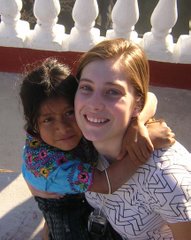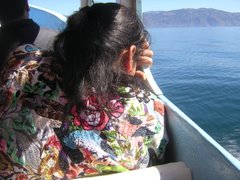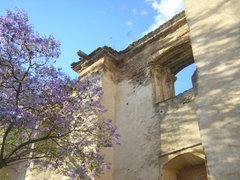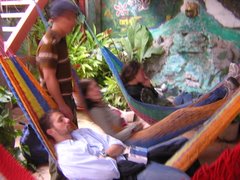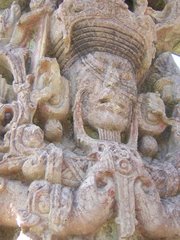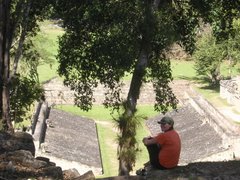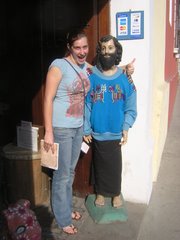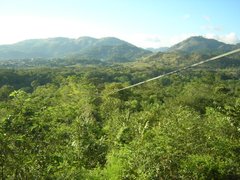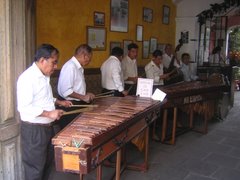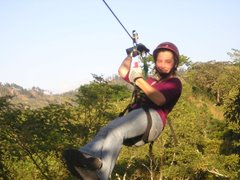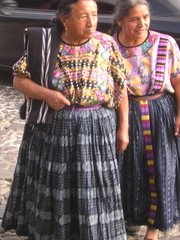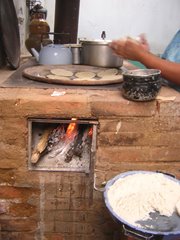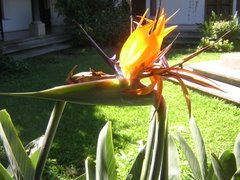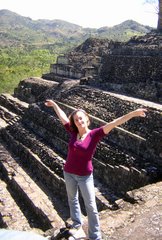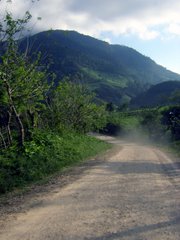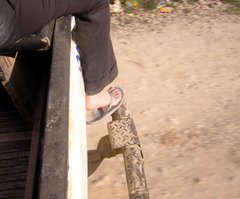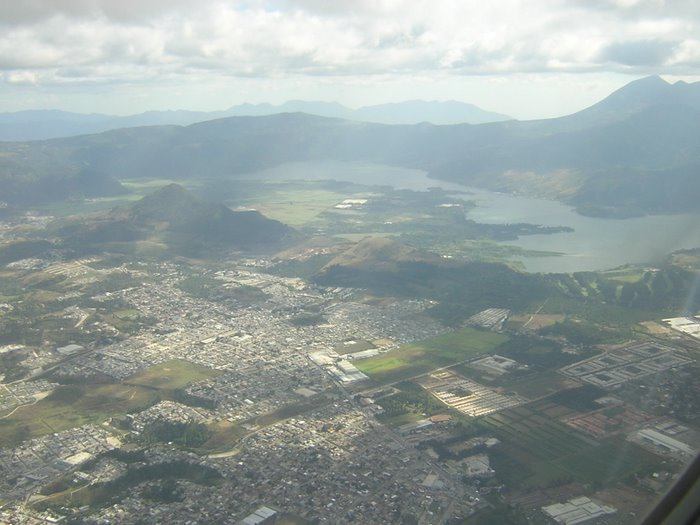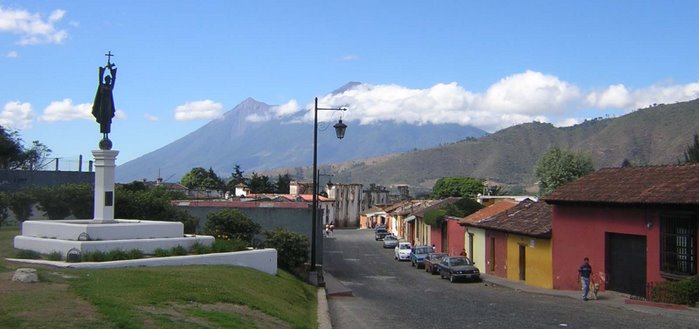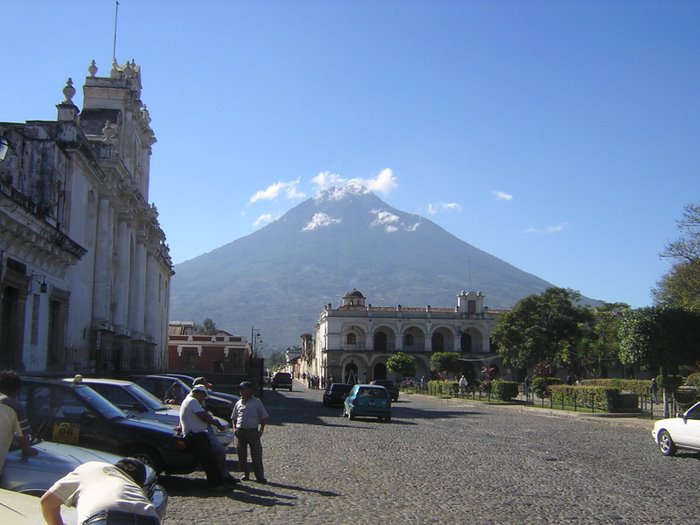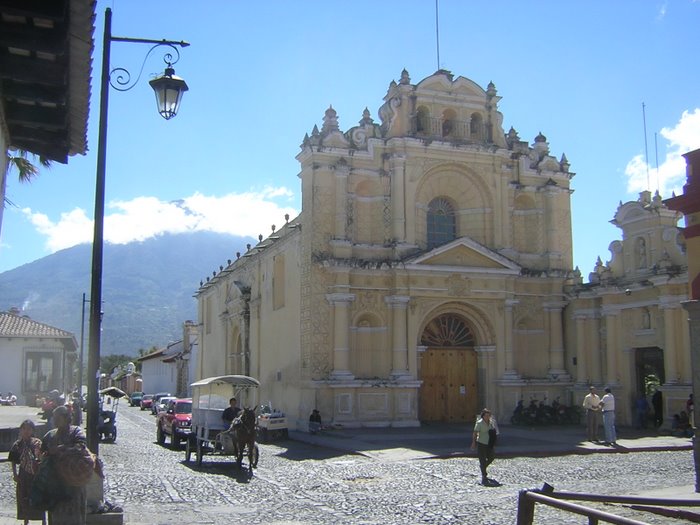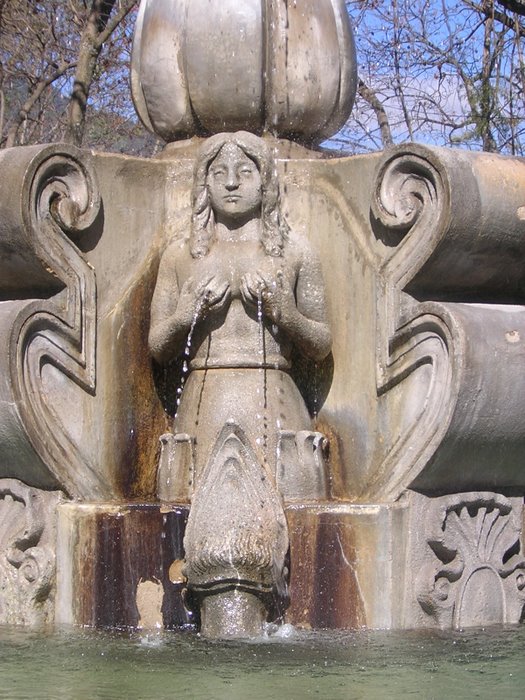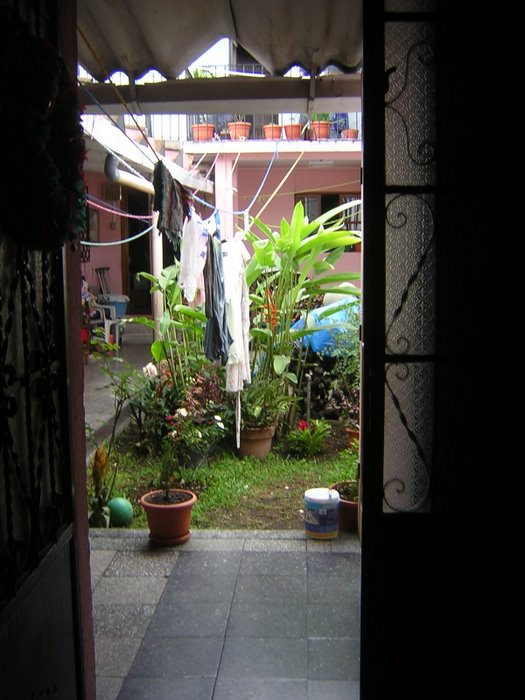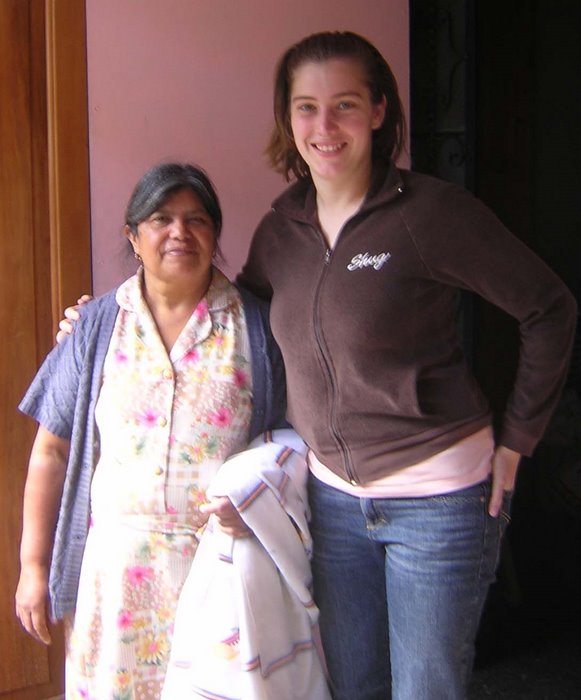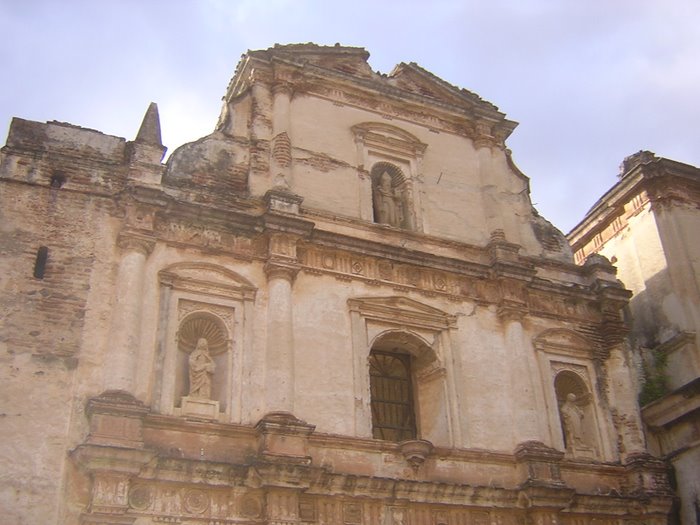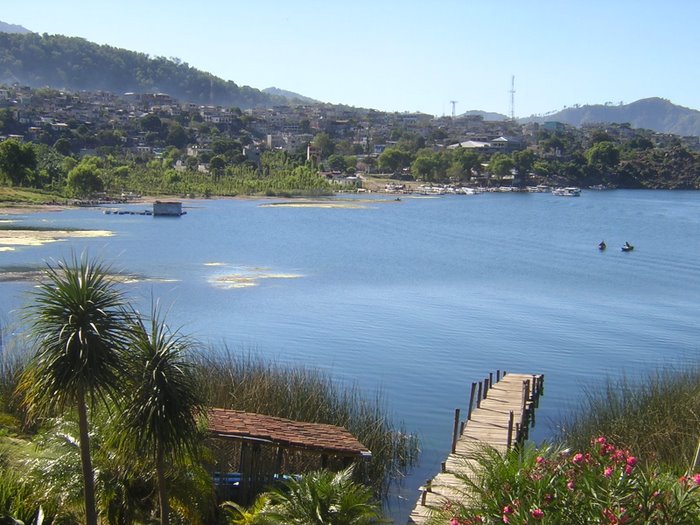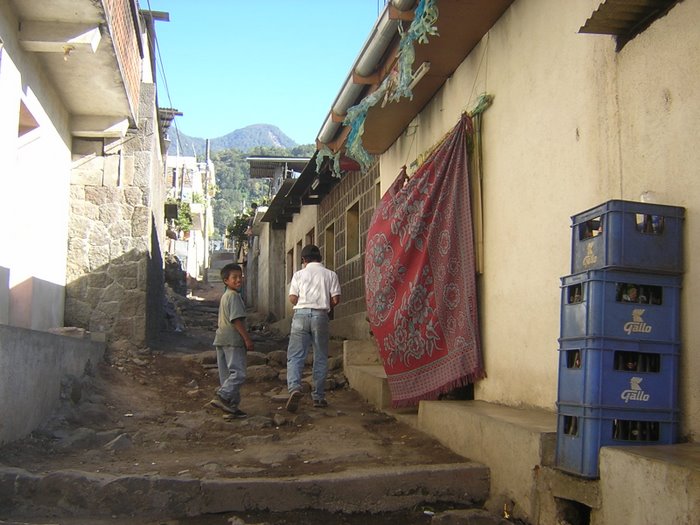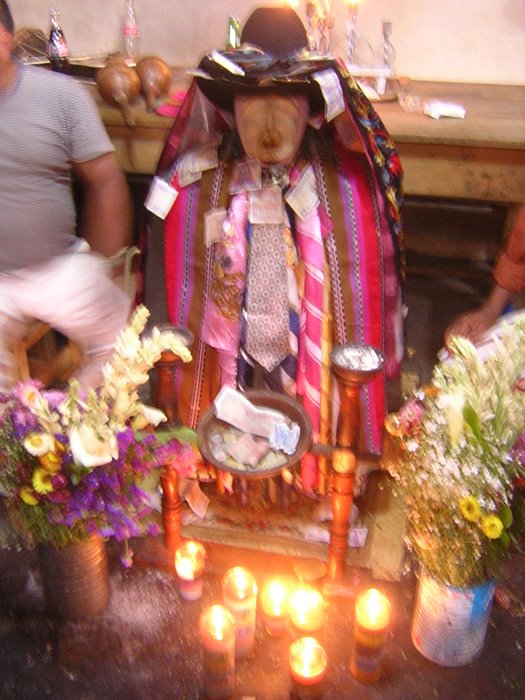
If my purpose for being here seems a little indistinct, it’s probably because I’ve yet to mention it at any good length. So let me clarify. I am here to learn. I am taking classes in the traditional form at CIRMA (Centro de Investigaciones Regionales de Mesoamerica), as well as absorbing the informal education that presents itself to all travelers. I am taking four official classes: History of Central America, Archaeology of the Maya, Literature of Central America, and Conversational Spanish. In addition, there is a colloquium series where some of Guatemalan’s finest and most distinguished minds speak to us (eight incredibly lucky students) about their areas of specialty. Outside of these classes, I have been taking private Spanish lessons twice a week with the daughter of my host family (she previously worked at one of the numerous language schools here in Antigua). Needless to say, with all of this packed into three school days (Tuesday through Thursday), and the traveling nearly every other weekend – I am busy. The free time I do have is spent at the gym at salsa-aerobics or writing and drawing.
Instead of outlining details of each class, I will give you excerpts worth repeating:
 This past weekend our archaeology class went on a trip to Takalik Abaj, a Maya site from the Preclassic period in Southern Guatemala. Our professor, Dr. Erick Ponciano (an archaeologist who is leading a project in the Peten) and another archaeologist leading the Takalik project site explained the significance of the details, which made it much more worthwhile. We were allowed to go behind the scenes because of Erick’s ties to the archaeology community, and were able to watch the excavation of newly discovered pottery and hold a few pottery shards in my hands (over 2,500 years old!). (After this we made for a quick trip to the beaches of Chiapas, Mexico.)
This past weekend our archaeology class went on a trip to Takalik Abaj, a Maya site from the Preclassic period in Southern Guatemala. Our professor, Dr. Erick Ponciano (an archaeologist who is leading a project in the Peten) and another archaeologist leading the Takalik project site explained the significance of the details, which made it much more worthwhile. We were allowed to go behind the scenes because of Erick’s ties to the archaeology community, and were able to watch the excavation of newly discovered pottery and hold a few pottery shards in my hands (over 2,500 years old!). (After this we made for a quick trip to the beaches of Chiapas, Mexico.)In our first colloquium meeting, Tani Adams, the director of CIRMA and head of CIRMA’s latest social awareness project called “¿Porqué estamos como estamos?” (Why are we the way we are?), spoke with us on perception of classes in Guatemala. Tani is a perfect of example of what this project is dedicated to – showcasing the vast diversity of the Guatemalan population and shattering preconceived notions of what it means to be “Guatemalan.” She is a blue eyed light skinned, fifth generation descendant of German farming settlers to Guatemala, was born in Guatemala, speaks Spanish, English and German and has U.S. citizenship (her father is American). She is a Guatemalan through and through, the product of an interesting part of the country’s history, and yet wherever she goes people assume she is a tourist. She is accustomed to having to defend her nationality on a daily basis, because there is no place for her in the national psyche’s conception of identity. Instead the Guatemalan world is divided into only two types of people: Ladinos (non-indians) and Indians. The racism which created this subdivision is continued today in subtle and not so subtle ways (there are elite Castellan families that to this day maintain blood charts, “proving” that they are untainted by indigenous blood). She explained this history of polarized thinking by asking us to list perceptions of “civilized” versus “uncivilized” peoples. This is what we came up with (and let me preface this list by saying that discussing perceptions of racism or even reasons, isn’t the same thing as condoning or accepting it, on the contrary it is to better understand and self-reflect on personal short-comings in order to change perceptions):
 Ladinos /Indians
Ladinos /IndiansCivilized /Backwardness
sophisticated /barbaric
educated /uneducated
industrious /lazy
rich /poor
clean /dirty – untouchable
healthy /sick
rapid /temporal
science /magic
logic /intuition
progress /stagnant – traditional
leader /follower
adult /child
male /female
citizen /subject
Culture* /culture*
*Culture with a capital C is used to signify “high culture” (ballet, symphony, opera, etc.), whereas culture with a small c is used to signify “low culture” (basket weaving, tortilla making, etc.); the “culture” that tourists come for. These perceptions of culture (little c) combined with the other elements on the list help to create a nostalgia and sense of loss for the “uncivilized other.” Tani formerly worked in D.C. as a lobbyist and said that the three issues which people responded to most (when fliers were sent out) were saving the whales, forests and “Indians.” Take a minute to think about the disparate lumping of these three things together. This sense of needing to “save the Indians” (who in reality have defended their own rights, passed revolutionary legislation in Guatemala allowing self-governance, and recently made huge political advances – Rigoberta Menchú, an indigenous woman, is running for president in this year’s upcoming election) is an idea created and perpetuated by the romanticizing of indigenous cultures. But in reality the profile or population that most needs help in Guatemala are young urban men with tattoos, because these men are the most likely to be discriminated, brought into the dark drug-world, and die early. But would people respond to a flyer asking for money to help this population? Probably not. It doesn’t fit within the prepackaged framework of who should be helped. This isn’t to say that discrimination of indigenous people and inequalities doesn’t exist, because they do (the changes recognized between the social imaginary and social consciousness are certainly different), but work combating racism is happening. Challenging people to think about race relations in these terms will hopefully reveal some uncomfortable truths and motivate changes. I am proud of the work CIRMA is doing.
 Switching to my history class, Professor Jose Antonio who was a former guerilla fighter with the FMLN in El Salvador characterized the people’s reasons for the social revolutions of Central America in unforgettable way. Pacing in front of that class, speaking in first person, he takes on a persona and with an intensity glimmering in his eye he says: “I work hard. All week long and all day long I work hard. I work to feed my woman and the children. All week I work and at the end of the work day I need to have a few drinks to make the work disappear from my mind. So I drink and I drink. And when I start missing my wife, I go home to her.” At this point his voice gets dark and deep, flexing machismo in his voice, and he stops pacing, “And that stupid woman who has been doing nothing all day, nothing but staying at home with the children, she says she is tired and won’t come to bed with me… So I have to beat her.” He says this last point as though it is the only clear logical conclusion, and a chill runs up and down my spine. I begin to believe in the character that my professor has created (my professor who is infinitely sweet and righteous) and I am afraid of him, because I know that there are men who think like this all over the world and he convincingly portrays this man. I suddenly see the intensity that every ex-fighter holds within. He continues, “I have to beat her to show her that she will respect me. Because I am the one who provides for her and the children.” He bangs his fist on the table, “I am the one in charge of this house. I am the one who gives her money for food. I am the one who does everything. So I must beat that stupid woman to show her I am right.” Breaking out of character, he resumes his natural gentle manner and asks us, “And after night after night of this pattern, do you know what happens? It happens all the time. One night the woman waits quietly for her husband to go to sleep. And she sneaks into his bedroom and is very quite. She uses a knife from the kitchen and she slits his throat. She kills the man who beats and represses her.” He sits down, “This is the same with revolutions and dictatorial nations.” I understand his past history, and his countries rebellion against Romero. His characterization of subjugated citizens as the battered housewife and tyrannical governments as the abusive husband is both powerful and compelling. It speaks to the multiple levels of violence of these countries; the individual violence behind closed doors and the organized uprisings against cruel governments.
Switching to my history class, Professor Jose Antonio who was a former guerilla fighter with the FMLN in El Salvador characterized the people’s reasons for the social revolutions of Central America in unforgettable way. Pacing in front of that class, speaking in first person, he takes on a persona and with an intensity glimmering in his eye he says: “I work hard. All week long and all day long I work hard. I work to feed my woman and the children. All week I work and at the end of the work day I need to have a few drinks to make the work disappear from my mind. So I drink and I drink. And when I start missing my wife, I go home to her.” At this point his voice gets dark and deep, flexing machismo in his voice, and he stops pacing, “And that stupid woman who has been doing nothing all day, nothing but staying at home with the children, she says she is tired and won’t come to bed with me… So I have to beat her.” He says this last point as though it is the only clear logical conclusion, and a chill runs up and down my spine. I begin to believe in the character that my professor has created (my professor who is infinitely sweet and righteous) and I am afraid of him, because I know that there are men who think like this all over the world and he convincingly portrays this man. I suddenly see the intensity that every ex-fighter holds within. He continues, “I have to beat her to show her that she will respect me. Because I am the one who provides for her and the children.” He bangs his fist on the table, “I am the one in charge of this house. I am the one who gives her money for food. I am the one who does everything. So I must beat that stupid woman to show her I am right.” Breaking out of character, he resumes his natural gentle manner and asks us, “And after night after night of this pattern, do you know what happens? It happens all the time. One night the woman waits quietly for her husband to go to sleep. And she sneaks into his bedroom and is very quite. She uses a knife from the kitchen and she slits his throat. She kills the man who beats and represses her.” He sits down, “This is the same with revolutions and dictatorial nations.” I understand his past history, and his countries rebellion against Romero. His characterization of subjugated citizens as the battered housewife and tyrannical governments as the abusive husband is both powerful and compelling. It speaks to the multiple levels of violence of these countries; the individual violence behind closed doors and the organized uprisings against cruel governments. In my literature class I am reading “The Inhabited Woman,” by Gioconda Belli, which I suggest you read if you are at all interested in an honest portrayal of a woman’s emotional description of her world. It deals with the revolution in Nicaragua and her involvement in the movement. I wish I could write like her. I also read “One Day of Life” by Manlio Argueta, which is harrowing, but worth a read if you are interested in Central America.
In my literature class I am reading “The Inhabited Woman,” by Gioconda Belli, which I suggest you read if you are at all interested in an honest portrayal of a woman’s emotional description of her world. It deals with the revolution in Nicaragua and her involvement in the movement. I wish I could write like her. I also read “One Day of Life” by Manlio Argueta, which is harrowing, but worth a read if you are interested in Central America.Another speaker who came to our colloquium was Dr. Ricardo Stein, the brother of the Vice President of Guatemala who has a PhD. in Mathematics, works in politics and is quite possibly one of the most intelligent people I have ever met. He spoke with us about the 1996 Peace Accords that officially ended the war and established a new government in Guatemala. He was on the creation committee of the peace accords and discussed candidly the accomplishments and shortcomings of the document now that ten years have passed. The points that I took home from this living genius were his comments on corruption. He stated that corruption would not exist if it was not beneficial or functional to the system.
 He explained that corruption could be a positive an effective tool in the hands of the right people, or a destructive and regretful tool in the hands of the wrong people. He believes that true change comes from the individuals manning the institutions. I would have to agree.
He explained that corruption could be a positive an effective tool in the hands of the right people, or a destructive and regretful tool in the hands of the wrong people. He believes that true change comes from the individuals manning the institutions. I would have to agree.As far as things that I have learned outside of class, the list goes on and on. I’ve learned to love thick corn tortillas. I’ve learned that I will never be fluent in Spanish, but that I can keep working on becoming functional. I’ve learned that it is more expensive to wear traditional clothing for indigenous people than imported clothing. I’ve relearned that children are truly the best way to break the cold ice that adults enclose themselves in. I’ve learned to appreciate the platonic friendships allowed between men and women in the U.S. And in turn, I’ve learned to hold my tongue and practice patience when talking to machos (which doesn’t mean I don’t despise it). I’ve learned that family is the most important value everywhere. And that Quetzaltenango, Guatemala makes the best hot chocolate in the entire world.
Until next time, Bonnie







